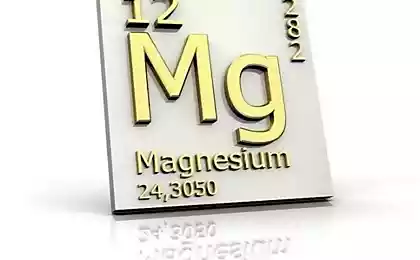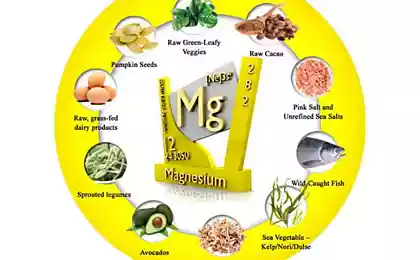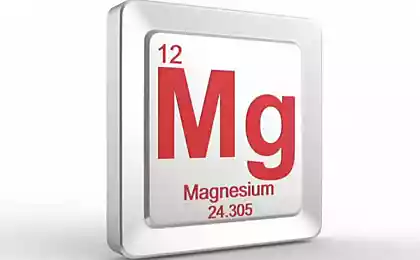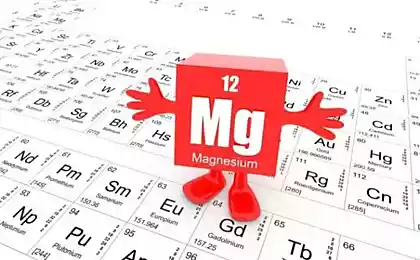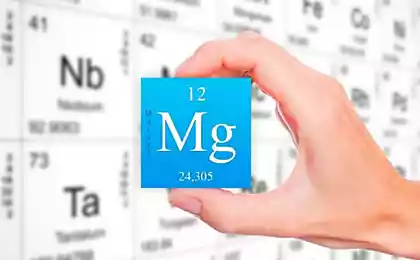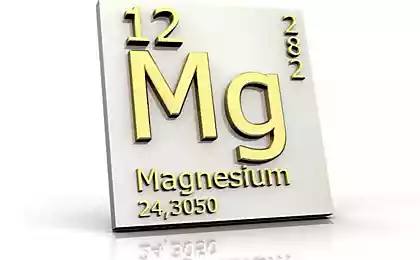582
The Magic Of Magnesium
Those who care about their body and how to build the perfect body, be aware that magnesium is a very important mineral. It participates in over 300 biochemical reactions in the body, many of which are directly related to muscle function and protein synthesis.
Most people do not get enough magnesium and in athletes with heavy training, this question arises more acutely.
Worst of all, magnesium is gradually "disappears" from the diet of modern man. Industrial methods of agriculture and processed food literally removed the magnesium and other valuable minerals from food, thus making the task to get sufficient amount of nutrients more difficult, even, it would seem, a healthy and varied diet.
So, what can we do? First, let's look at why magnesium is so important.
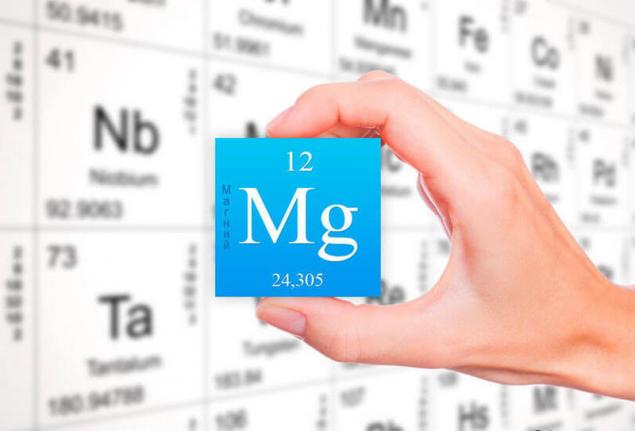
Parathyroid hormone, vitamin D and... atherosclerosis?
As already mentioned, magnesium plays an important role in human biochemistry. For example, magnesium deficiency is often accompanied by hypoparathyroidism (failure of the parathyroid glands) and a low level of vitamin D.
Magnesium deficiency also leads to disruption of metabolism in bone tissue. While some animal trials have found that supplementing the diet with magnesium, we can inhibit the development of atherosclerosis.
Insulin sensitivity
Magnesium is known as the mineral that controls the level of glucose, and it is closely associated with insulin sensitivity and low levels of magnesium can sometimes lead to the development of type II diabetes. In addition, studies in rats have shown that adding magnesium to the diet, in most cases, diabetes can be prevented.
It is also interesting that high levels of glucose and insulin in the blood significantly lower levels of magnesium. It would seem, creates a vicious circle in which low levels of magnesium leads to poor glucose control and insulin sensitivity, which in turn will further reduce the amount of magnesium in the body.
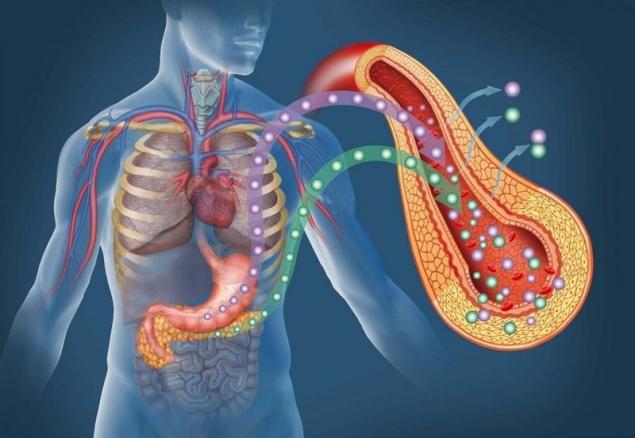
In healthy volunteers found that after 4 weeks of diet with insufficient amount of magnesium in insulin sensitivity is reduced by 25%. This allows scientists to suggest that a magnesium deficiency can lead to insulin resistance.
It has been proven that magnesium supplementation increases insulin sensitivity in people with resistance to it, as in diabetic patients and in apparently healthy people. Let's look at some of these studies.
- A 16-week study on type II diabetics showed that magnesium supplements had a positive effect on glucose levels, insulin sensitivity and HbA1c level (form of hemoglobin, which is a measure of the average glucose concentration in the blood plasma over an extended period of time). The HbA1c level improved by 22% percent, but this figure is just incredible. Below the diabetic HbA1c has dropped from 8% (poor) to 6.2% (very good), it only took 4 months.
- recent studies have shown that adding to the diet of magnesium, even if it is enough, can have a positive effect. 6 months of use magnesium supplements people suffering from obesity, but with normal insulin sensitivity and with sufficient levels of magnesium in the blood, increased insulin sensitivity and also reduce sugar level fasting 7%.
- a study on insulin-resistant, but not with diabetes in people with low levels of magnesium in blood after 16 weeks showed incredible results. Taking magnesium supplements, the participants had reduced their insulin resistance by 43%, the amount of fasting insulin by 32%. This suggests that magnesium deficiency was one of the reasons that these people had insulin resistance. Also magnesium supplements had improved lipid levels in the blood. The amount of total cholesterol, LDL-cholesterol and triglycerides decreased, while HDL levels increased. Reducing the amount of triglycerides (39%!) the most important, because better control of level of glucose in the blood prevents the liver from make more triglycerides. However, other improvements are also very important.
Magnesium and cardiovascular disease Recent scientific review suggests that magnesium deficiency can lead to increased LDL, endothelial dysfunction, an increase in the intensity of inflammation and activity of oxidizing processes, the narrowing of the coronary arteries (and therefore reducing the supply of oxygen and nutrients to the heart). It all sounds not very attractive.
Taking magnesium supplements has been shown to reduce LPNA (and improves other lipids in the blood), restores endothelial dysfunction in people with coronary heart disease and reduces inflammation.
Where do I get magnesium?
The best sources of magnesium:
As specific examples are salmon, halibut, spinach, almonds, potatoes, cashews, sesame seeds, pumpkin seeds, yogurt, brown rice. All of these products – excellent sources of this precious mineral.
It is important to note that the magnesium content of plant foods depends on soil quality, so buying farm vegetables and fruits will provide You with a higher level of magnesium. And while this is still considered speculative, yet nobody argues that the vegetables grown on an industrial scale, often grow in depleted soils. You can't get vegetables and fruits, nutrient-rich, nutrient-poor soil, so maybe it's still worth to go and buy vegetables from some local farmers.
It is also important to mention that products such as whole grains, beans, nuts and seeds contain a lot of phytic acid. Phytic acid contains a number of substances, bind to magnesium and block its absorption.
Historically, healthy non-industrialized nation consumed large quantities of fermented grain. The fermentation process significantly reduces the amount of phytic acid and increases the bioavailability of nutrients and increases their absorption. They didn't know how it works, they just know that it works. Therefore, I recommend to use the sprouted grains to reduce the amount of phytic acid and other harmful substances.
Also a good idea to soak beans and legumes for at least 24 hours, fry the purchased nuts as all these methods reduce the amount of phytic acid.
Also, one of the options is to purchase a variety of dietary Supplements containing magnesium.
Also interesting: a Healthy balance of sodium-potassium in foods
Why leaches calcium from the body
Conclusion
Magnesium is essential for proper metabolism of bone tissue, of vitamin D metabolism, parathyroid function, insulin sensitivity, glucose tolerance, and proper lipid levels in the blood and prevention of atherosclerosis not to mention cardiovascular diseases. It even helps You to relax after a busy day and sleep like a baby.
But we also know that most people do not consume enough magnesium, and that the industrialization of agriculture will continue to reduce the level of this important mineral in food. Diet and supplementation with magnesium, will help You cope with this problem.
Consumption of foods rich in magnesium, along with appropriate supplements will provide You with the necessary level of this mineral and will give You more positive effects concerning health, what do You remember from this article. And can You remember all... It has recently been discovered that magnesium improves memory and cognitive function.published
Author: Brian St. Pierre, translated by Boris Zazulin
Source: do4a.com/threads/%D0%9C%D0%B0%D0%B3%D0%B8%D1%8F-%D0%BC%D0%B0%D0%B3%D0%BD%D0%B8%D1%8F.15292/
Most people do not get enough magnesium and in athletes with heavy training, this question arises more acutely.
Worst of all, magnesium is gradually "disappears" from the diet of modern man. Industrial methods of agriculture and processed food literally removed the magnesium and other valuable minerals from food, thus making the task to get sufficient amount of nutrients more difficult, even, it would seem, a healthy and varied diet.
So, what can we do? First, let's look at why magnesium is so important.

Parathyroid hormone, vitamin D and... atherosclerosis?
As already mentioned, magnesium plays an important role in human biochemistry. For example, magnesium deficiency is often accompanied by hypoparathyroidism (failure of the parathyroid glands) and a low level of vitamin D.
Magnesium deficiency also leads to disruption of metabolism in bone tissue. While some animal trials have found that supplementing the diet with magnesium, we can inhibit the development of atherosclerosis.
Insulin sensitivity
Magnesium is known as the mineral that controls the level of glucose, and it is closely associated with insulin sensitivity and low levels of magnesium can sometimes lead to the development of type II diabetes. In addition, studies in rats have shown that adding magnesium to the diet, in most cases, diabetes can be prevented.
It is also interesting that high levels of glucose and insulin in the blood significantly lower levels of magnesium. It would seem, creates a vicious circle in which low levels of magnesium leads to poor glucose control and insulin sensitivity, which in turn will further reduce the amount of magnesium in the body.

In healthy volunteers found that after 4 weeks of diet with insufficient amount of magnesium in insulin sensitivity is reduced by 25%. This allows scientists to suggest that a magnesium deficiency can lead to insulin resistance.
It has been proven that magnesium supplementation increases insulin sensitivity in people with resistance to it, as in diabetic patients and in apparently healthy people. Let's look at some of these studies.
- A 16-week study on type II diabetics showed that magnesium supplements had a positive effect on glucose levels, insulin sensitivity and HbA1c level (form of hemoglobin, which is a measure of the average glucose concentration in the blood plasma over an extended period of time). The HbA1c level improved by 22% percent, but this figure is just incredible. Below the diabetic HbA1c has dropped from 8% (poor) to 6.2% (very good), it only took 4 months.
- recent studies have shown that adding to the diet of magnesium, even if it is enough, can have a positive effect. 6 months of use magnesium supplements people suffering from obesity, but with normal insulin sensitivity and with sufficient levels of magnesium in the blood, increased insulin sensitivity and also reduce sugar level fasting 7%.
- a study on insulin-resistant, but not with diabetes in people with low levels of magnesium in blood after 16 weeks showed incredible results. Taking magnesium supplements, the participants had reduced their insulin resistance by 43%, the amount of fasting insulin by 32%. This suggests that magnesium deficiency was one of the reasons that these people had insulin resistance. Also magnesium supplements had improved lipid levels in the blood. The amount of total cholesterol, LDL-cholesterol and triglycerides decreased, while HDL levels increased. Reducing the amount of triglycerides (39%!) the most important, because better control of level of glucose in the blood prevents the liver from make more triglycerides. However, other improvements are also very important.
Magnesium and cardiovascular disease Recent scientific review suggests that magnesium deficiency can lead to increased LDL, endothelial dysfunction, an increase in the intensity of inflammation and activity of oxidizing processes, the narrowing of the coronary arteries (and therefore reducing the supply of oxygen and nutrients to the heart). It all sounds not very attractive.
Taking magnesium supplements has been shown to reduce LPNA (and improves other lipids in the blood), restores endothelial dysfunction in people with coronary heart disease and reduces inflammation.
Where do I get magnesium?

The best sources of magnesium:
- fish
- nuts,
- seeds,
- beans,
- greens,
- whole grains,
- some fruits and vegetables.
As specific examples are salmon, halibut, spinach, almonds, potatoes, cashews, sesame seeds, pumpkin seeds, yogurt, brown rice. All of these products – excellent sources of this precious mineral.
It is important to note that the magnesium content of plant foods depends on soil quality, so buying farm vegetables and fruits will provide You with a higher level of magnesium. And while this is still considered speculative, yet nobody argues that the vegetables grown on an industrial scale, often grow in depleted soils. You can't get vegetables and fruits, nutrient-rich, nutrient-poor soil, so maybe it's still worth to go and buy vegetables from some local farmers.
It is also important to mention that products such as whole grains, beans, nuts and seeds contain a lot of phytic acid. Phytic acid contains a number of substances, bind to magnesium and block its absorption.
Historically, healthy non-industrialized nation consumed large quantities of fermented grain. The fermentation process significantly reduces the amount of phytic acid and increases the bioavailability of nutrients and increases their absorption. They didn't know how it works, they just know that it works. Therefore, I recommend to use the sprouted grains to reduce the amount of phytic acid and other harmful substances.
Also a good idea to soak beans and legumes for at least 24 hours, fry the purchased nuts as all these methods reduce the amount of phytic acid.
Also, one of the options is to purchase a variety of dietary Supplements containing magnesium.
Also interesting: a Healthy balance of sodium-potassium in foods
Why leaches calcium from the body
Conclusion
Magnesium is essential for proper metabolism of bone tissue, of vitamin D metabolism, parathyroid function, insulin sensitivity, glucose tolerance, and proper lipid levels in the blood and prevention of atherosclerosis not to mention cardiovascular diseases. It even helps You to relax after a busy day and sleep like a baby.
But we also know that most people do not consume enough magnesium, and that the industrialization of agriculture will continue to reduce the level of this important mineral in food. Diet and supplementation with magnesium, will help You cope with this problem.
Consumption of foods rich in magnesium, along with appropriate supplements will provide You with the necessary level of this mineral and will give You more positive effects concerning health, what do You remember from this article. And can You remember all... It has recently been discovered that magnesium improves memory and cognitive function.published
Author: Brian St. Pierre, translated by Boris Zazulin
Source: do4a.com/threads/%D0%9C%D0%B0%D0%B3%D0%B8%D1%8F-%D0%BC%D0%B0%D0%B3%D0%BD%D0%B8%D1%8F.15292/
How to help the spine: a Complex of exercises for strengthening back muscles
The healing properties of an iodine mesh


